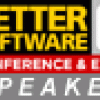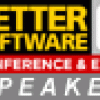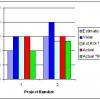|
User-Centered Design Roundtable with Lynn Miller, Jeff Patton, and Rebecca Wirfs-Brock
Podcast
This roundtable addresses the integration of User-Centered Design into an agile project. |
||
|
Mike Hill - Agile 2005
Podcast
At the Agile 2005 conference, Mike discusses his new book and the Coders Without Borders project that he is starting up. |
||
|
Bob Martin - Agile 2005 Conference
Podcast
A talk with Bob Martin at the Agile 2005 conference about the convergence of Agile Methodologies and the minimal list of practices that a team could employ to become agile. |
||
|
Structure Marking Structure marking is a programming technique that defends data against damage, especially from software bugs. It adds flags to data structures and checks them at each use to detect damaged data immediately. |
Tom Van Vleck
August 5, 2005 |
|
|
Information Gathering If your customer interview questions focus too narrowly on a problem that must be solved, you run the risk of missing information that could be critical to a successful outcome. In this column, Naomi Karten says playing detective improves your ability to gather information. To improve the odds of success, it's important to ask questions from multiple perspectives—and to pay attention not only to the customers' response, but to how they say it as well. |
||
 |
Openness, Trust, and Healthy Paranoia Trust must be earned in any relationship; it is not automatic nor can it be assumed. You only learn how much you can trust someone over a period of time. The same principle rings true in project management. In this week's column, Peter Clark shares a valuable lesson for project managers and other management professionals, demonstrating that a healthy level of paranoia must precede openness. If openness is premature, one's trust could prove to be unfounded in the end. |
Peter Clark
July 15, 2005 |
 |
What's on Your Not-to-Do List? Drawing up a to-do list sounds like a logical starting point when you want to prioritize your workload. But if you have an extra-long list of tasks, the list you should start with is the not-to-do list. Doing so forces you to take an extra hard look at what you're doing and if you should be doing it. Learn more about Johanna Rothman's not-to-do list, how it helps you stay focused on the most important tasks, and how it inevitably helps you maintain your value to the organization. |
|
|
Paving Cow Paths In the IT world, "paving cow paths" means automating a business process as is, without thinking too much about whether or not that process is effective or efficient. Often business process automation initiatives require figuring out entirely new ways of doing business processes–impossible prior to automation (for example, work flow automation and digital image processing)–defining more effective and efficient process highways. In this week's column, Jim Highsmith warns that when we pave the cow paths and ignore the highways, we do a disservice to our customers. |
Jim Highsmith
June 21, 2005 |
|
 |
Free Time is Not Free Unpaid overtime has negative personal and business consequences. Although regarded as free time by many organizations, there is a true business cost to not estimating or counting overtime hours, whether paid or not. Ed Weller presents the argument that those who do not count free time in their planning and tracking will make poor decisions and often invest in the wrong projects. |
|
|
Ping-Pong Programming: Enhance Your TDD and Pair Programming Practices Team player Dave Hoover wants to share a software development practice he enjoys. It emerged from the practices of extreme programming as a competitive yet simultaneously collaborative practice. Dave has found that this practice promotes the flow of knowledge between software developers better than any other practice he has experienced. As you might have guessed from the title of this week's column, this practice is called ping-pong programming, or P3 for short. |
Dave Hoover
May 31, 2005 |
Pages
Upcoming Events
| Apr 28 |
STAREAST Software Testing Conference in Orlando & Online |
| Jun 02 |
AI Con USA Bridging Minds and Machines |
| Sep 22 |
STARWEST Software Testing Conference in Anaheim & Online |
| Oct 13 |
Agile + DevOps USA The Conference for Agile and DevOps Professionals |






